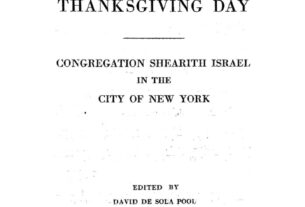The mishnah on our daf begins chapter 8 of Tractate Nedarim. The forsworn item in our mishnah today is wine. In recent weeks we have studied vows to abstain from cooked foods, pickled foods, fish, milk, meat, dates, grapes, olives, cabbage, beans, garlic, lentils, vegetables, and grains — among other consumables. Generally, commentators view this mishnah as yet another example of a food or drink one might vow not to consume, much like the others. This notwithstanding, I actually think it is significant that our mishnah, which is all about linguistic precision, specifically uses wine as its example, an idea to which I will return below.
Today’s mishnah about wine is particularly concerned with the time-frame of the vow. Let’s look at an excerpt:
If one vows: “Wine is forbidden to me, and for that reason I will not taste it today,” he is prohibited from drinking wine only until nightfall.
But if he said that wine is forbidden to him for one day … he is prohibited from drinking wine from day to day (i.e. from the time he took the vow until the same time the next day).
According to both Rashi and the Ran, by using the Hebrew word hayom, today, the person taking the vow declares an intention to refrain from wine for that specific day until the day ends with nightfall. By using the Hebrew words yom echad, one day, the person intends to refrain from wine for a full 24-hour period.
The Gemara next reports a law taught in the Jerusalem Talmud, Nedarim 8:1, that responds to this mishnah’s statement that one can make a vow that lasts only until sundown:
Rabbi Yirmeya said: Even when darkness falls he is not permitted; rather, he is required to request that a halakhic authority dissolve his vow.
The person vowing not to drink wine today was very precise and the mishnah was clear. Why, then, does Rabbi Yirmeya require him to go to an expert to dissolve that vow? The Gemara explains:
The sages issued a rabbinic decree in the case of one who said that his vow applies today, due to the confusion that might be caused in a case where one said that his vow applies for one day.
A person using the language of one day, which subjects them to a longer time frame, might mistakenly believe that it is no different from the phrase today, and release themselves from the vow prematurely. Thus, expert rabbinic annulment ensures that no one ends accidentally violates their vow.
Required dissolution of a person’s “today” vow reflects the sages’ profound discomfort with making vows in the first place, as the Gemara then explains:
Rabbi Natan says: Anyone who vows, it is as if he has built a personal altar. And one who fulfills the vow, is as though he burns portions meant for the altar in the Temple upon it.
The Book of Deuteronomy is clear: There is only one altar that is acceptable to God, and it is the central altar of the Temple. Rabbi Natan’s startling statement, therefore, equates vowing with improper worship of God.
Commenting on this teaching at Nedarim 22a, the Ran draws a creative connection between Deuteronomy’s prohibition and vows. A person who takes a vow of abstinence from God’s gifts is like a person who builds a personal altar, when the altar in God’s Temple is sufficient: He goes beyond what God demands of us, unnecessarily. The Ran quotes the Jerusalem Talmud to express God’s discomfort with such ascetic behavior:
The Torah’s prohibitions aren’t enough for you that you have to go and impose other restrictions on yourself as well?
This repudiation of asceticism is given full voice precisely using wine as the mishnah’s main example of a time frame vow, which I suspect is no accident. After the destruction of the second Temple in 70 CE by the Romans, some Jews vowed to refrain from anything used in the Temple, especially wine and meat, as a way of grieving its destruction. Rabbi Yehoshua ben Hananiah confronted them:
My children, to mourn too much is not possible. (Tosefta Sotah 15:12)
Grieve by remembering the holy place, he counseled, but don’t stop enjoying the good things given to us by God. This tosefta also famously teaches that one should plaster one’s home but leave a small portion unplastered to acknowledge the destruction of the Temple. And this need to move on with life and joy includes wine, especially, because wine “gladdens the hearts of human beings” (Psalm 104:15)
— something that God wants for us.
Read all of Nedarim 60 on Sefaria.
This piece originally appeared in a My Jewish Learning Daf Yomi email newsletter sent on December 24th, 2022. If you are interested in receiving the newsletter, sign up here.
The post Nedarim 60 appeared first on My Jewish Learning.




